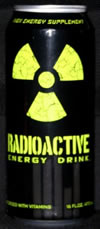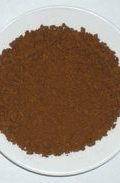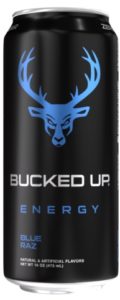Radioactive Energy Drink

Serving Size
16
fl oz
473
ml
📈 Comparison Chart
High
Med
Low
1800
1500
1200
900
600
300
0
🧐 Radioactive Energy Drink Dosage Information
Radioactive Energy Drink contains moderate amounts of caffeine in it, You may consume upto 1-3 servings in a day, making sure your total caffeine intake is less than 300mg in a day. This Drink also consists of high sugar levels, if you consume more than 1 serving, try to be active through out the day.
🧃 Ingredients
✅ Your Safe Caffeine Limit
Enter your age:
Enter your weight:
Your results will show here 👇
🤔 About Radioactive Energy Drink
Radioactive Energy Drink contains 156 mg of caffeine in a 16 fl oz can. It is a popular energy drink known for its high caffeine content and refreshing taste. Despite its popularity, there are some frequently asked questions about the drink that we will address in this blog post.
📝 Frequently Asked Questions
1. How Long Does It Take to Kick In?
After consuming Radioactive Energy Drink, the caffeine typically takes about 15-30 minutes to kick in and reach peak levels in the bloodstream.
2. How Long Does It Stay in your body?
The half-life of caffeine in the body is about 5-6 hours, meaning it takes this amount of time for half of the caffeine to be metabolized and eliminated. However, individual factors such as metabolism and liver function can affect how long caffeine stays in the body.
3. Will it affect your sleep cycle?
Consuming Radioactive Energy Drink, especially in the afternoon or evening, can disrupt sleep patterns and make it difficult to fall asleep. It's important to consume caffeinated drinks in moderation and avoid them close to bedtime.
4. Can It Cause Heart Issues?
Excessive consumption of caffeine, including from energy drinks, can be associated with an increased risk of heart palpitations, high blood pressure, and other cardiovascular issues. People with underlying heart conditions should be cautious about consuming caffeine.
5. Can it make you anxious?
High doses of caffeine can trigger anxiety and nervousness, especially in individuals who are sensitive to its effects. It's important to monitor caffeine intake and be aware of any negative psychological effects.
🍶 Similar Drinks

Death Wish Latte
Caffeine: 300mg
Serving: 236ml

A&W Cream Soda
Caffeine: 0mg
Serving: 354ml

Monster Ripper Energy Juice (UK)
Caffeine: 160mg
Serving: 500ml

Coca-Cola Classic
Caffeine: 34mg
Serving: 354ml

Club Mate (EU)
Caffeine: 100mg
Serving: 500ml







